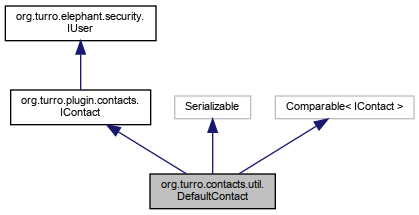
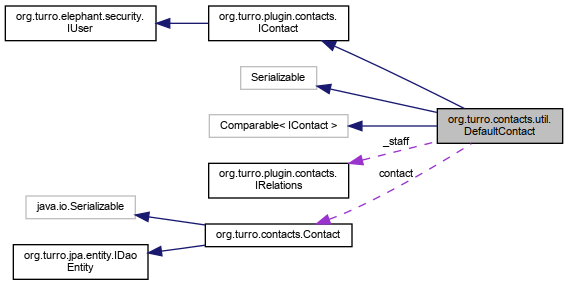
Public Member Functions | |
| DefaultContact () | |
| DefaultContact (Object object) | |
| DefaultContact (Contact contact) | |
| Object | loadById (String id) |
| Object | loadByLogin (String login) |
| Object | loadLogged (Application app) |
| Object | getContact () |
| void | setContact (Object contact) |
| String | getId () |
| String | getGlobalId () |
| String | getGrouping () |
| String | getDeepGrouping () |
| String | getLogin () |
| String | getName () |
| String | getFriendly () |
| String | getFormal () |
| String | getFullName () |
| String | getTradeName () |
| String | getEmail () |
| Locale | getLocale () |
| String | getConnector (String id) |
| List< String > | getConnectorList (String id) |
| IRelations | getCompanyRelations () |
| IRelations | getStaffRelations () |
| List< IContact > | getRelations (String id) |
| List< IContact > | getRelations () |
| IContact | getBusiness () |
| List< IContact > | getBusinessList () |
| List< IContact > | getCoworkers () |
| List< IContact > | getCoworkers (IContact business) |
| boolean | isInBusiness (IContact worker) |
| void | setConnector (String id, String value) |
| void | setName (String value) |
| void | setPassword (String newValue, String repeatValue) |
| void | applyChanges () |
| boolean | isValid () |
| boolean | checkPassword (String password) |
| boolean | checkPassword2 (String password) |
| String | getCommentValue (String key) |
| Object | getObject (String key) |
| void | setObject (String key, Serializable value) |
| boolean | isWebUser () |
| boolean | isWebapp () |
| boolean | isUserMenu () |
| boolean | isDeactivated () |
| List< String > | getSyndications () |
| FlatPermissions | getPermissions () |
| void | resetPermissions () |
| IUser | getAsUser () |
| boolean | acceptsLang (String lang) |
| List< IContact > | loadByPartialName (String name) |
| List< IContact > | loadByPartialName (String name, KeyValueMap kvm) |
| IContact | loadByName (String name) |
| IContact | loadByEmail (String email) |
| void | setAttribute (String key, Object value) |
| Object | getAttribute (String key) |
| List< IContact > | getBySyndication (String syndication) |
| List< IContact > | getByRole (String role) |
| List< IContact > | getByGrouping (String grouping) |
| List< IContact > | getByGrouping (List< String > groupings) |
| List< IContact > | getCompanies () |
| List< IContact > | getCenters () |
| List< IContact > | getHHRR () |
| List< IContact > | getStudents () |
| void | startContactFromValues (KeyValueMap values) |
| void | syndicate (String syndicationName, boolean syndicate) |
| String | getFace () |
| Faces | getFaces () |
| IProfile | getProfile () |
| boolean | isAdmin () |
| boolean | isUser () |
| boolean | isCompany () |
| boolean | isCenter () |
| boolean | isInternal () |
| boolean | isWorker () |
| boolean | isStudent () |
| boolean | isResponsible () |
| boolean | isHHRR () |
| boolean | isWorker (IContact business) |
| boolean | isStudent (IContact business) |
| boolean | isResponsible (IContact business) |
| boolean | isHHRR (IContact business) |
| boolean | isInNetworking () |
| boolean | isInPremiumNetworking () |
| String | getLangTranslator () |
| boolean | isActor (String actor) |
| boolean | isActor (Object entity, String actor) |
| IContact | getLogged () |
| boolean | isOutsider () |
| boolean | accepts (Object object) |
| int | hashCode () |
| boolean | equals (Object obj) |
| int | compareTo (IContact o) |
| boolean | validate (String login, String password) |
| boolean | validate2 (String password2) |
| boolean | impersonate (String login) |
| boolean | impersonateByEmail (String email) |
| void | reload () |
| boolean | isThisUser (String id) |
| String | getProperty (String key) |
| boolean | isInRole (String role) |
| boolean | hasAnyRoleKey (String role) |
 Public Member Functions inherited from org.turro.plugin.contacts.IContact Public Member Functions inherited from org.turro.plugin.contacts.IContact | |
| void | setApplication (Application app) |
Static Public Member Functions | |
| static String | fullName (String contactId) |
Protected Attributes | |
| Contact | contact = null |
| boolean | superUser = false |
Additional Inherited Members | |
 Static Public Attributes inherited from org.turro.elephant.security.IUser Static Public Attributes inherited from org.turro.elephant.security.IUser | |
| static final String | CONNECTOR_EMAIL = "Email" |
| static final String | CONNECTOR_TRADE = "TradeName" |
| static final String | CONNECTOR_FISCAL = "FiscalName" |
| static final String | CONNECTOR_EMAIL_LOGIN = "EmailLogin" |
| static final String | ADDRESS_FISCAL = "Fiscal" |
| static final String | LOGGED_USER = "xp_user" |
| static final String | INTERNAL_SIGNIN = "InternalSignIn" |
Definition at line 75 of file DefaultContact.java.
| org.turro.contacts.util.DefaultContact.DefaultContact | ( | ) |
Definition at line 79 of file DefaultContact.java.
| org.turro.contacts.util.DefaultContact.DefaultContact | ( | Object | object | ) |
Definition at line 82 of file DefaultContact.java.
| org.turro.contacts.util.DefaultContact.DefaultContact | ( | Contact | contact | ) |
Definition at line 86 of file DefaultContact.java.
| boolean org.turro.contacts.util.DefaultContact.accepts | ( | Object | object | ) |
Implements org.turro.plugin.contacts.IContact.
Definition at line 797 of file DefaultContact.java.

| boolean org.turro.contacts.util.DefaultContact.acceptsLang | ( | String | lang | ) |
Implements org.turro.plugin.contacts.IContact.
Definition at line 479 of file DefaultContact.java.

| void org.turro.contacts.util.DefaultContact.applyChanges | ( | ) |
Implements org.turro.plugin.contacts.IContact.
Definition at line 362 of file DefaultContact.java.

| boolean org.turro.contacts.util.DefaultContact.checkPassword | ( | String | password | ) |
Implements org.turro.plugin.contacts.IContact.
Definition at line 376 of file DefaultContact.java.

| boolean org.turro.contacts.util.DefaultContact.checkPassword2 | ( | String | password | ) |
Definition at line 385 of file DefaultContact.java.

| int org.turro.contacts.util.DefaultContact.compareTo | ( | IContact | o | ) |
| boolean org.turro.contacts.util.DefaultContact.equals | ( | Object | obj | ) |
Implements org.turro.elephant.security.IUser.
Definition at line 816 of file DefaultContact.java.

|
static |
| IUser org.turro.contacts.util.DefaultContact.getAsUser | ( | ) |
Implements org.turro.plugin.contacts.IContact.
Definition at line 474 of file DefaultContact.java.
| Object org.turro.contacts.util.DefaultContact.getAttribute | ( | String | key | ) |
Implements org.turro.plugin.contacts.IContact.
Definition at line 532 of file DefaultContact.java.

| IContact org.turro.contacts.util.DefaultContact.getBusiness | ( | ) |
Implements org.turro.plugin.contacts.IContact.
Definition at line 269 of file DefaultContact.java.

| List<IContact> org.turro.contacts.util.DefaultContact.getBusinessList | ( | ) |
Implements org.turro.plugin.contacts.IContact.
Definition at line 280 of file DefaultContact.java.

| List<IContact> org.turro.contacts.util.DefaultContact.getByGrouping | ( | List< String > | groupings | ) |
Implements org.turro.plugin.contacts.IContact.
Definition at line 577 of file DefaultContact.java.

| List<IContact> org.turro.contacts.util.DefaultContact.getByGrouping | ( | String | grouping | ) |
Implements org.turro.plugin.contacts.IContact.
Definition at line 572 of file DefaultContact.java.
| List<IContact> org.turro.contacts.util.DefaultContact.getByRole | ( | String | role | ) |
Implements org.turro.plugin.contacts.IContact.
Definition at line 556 of file DefaultContact.java.

| List<IContact> org.turro.contacts.util.DefaultContact.getBySyndication | ( | String | syndication | ) |
Implements org.turro.plugin.contacts.IContact.
Definition at line 537 of file DefaultContact.java.
| List<IContact> org.turro.contacts.util.DefaultContact.getCenters | ( | ) |
Implements org.turro.plugin.contacts.IContact.
Definition at line 605 of file DefaultContact.java.

| String org.turro.contacts.util.DefaultContact.getCommentValue | ( | String | key | ) |
Implements org.turro.plugin.contacts.IContact.
Definition at line 395 of file DefaultContact.java.

| List<IContact> org.turro.contacts.util.DefaultContact.getCompanies | ( | ) |
Implements org.turro.plugin.contacts.IContact.
Definition at line 592 of file DefaultContact.java.

| IRelations org.turro.contacts.util.DefaultContact.getCompanyRelations | ( | ) |
Implements org.turro.plugin.contacts.IContact.
Definition at line 230 of file DefaultContact.java.

| String org.turro.contacts.util.DefaultContact.getConnector | ( | String | id | ) |
Implements org.turro.plugin.contacts.IContact.
Definition at line 201 of file DefaultContact.java.

| List<String> org.turro.contacts.util.DefaultContact.getConnectorList | ( | String | id | ) |
Implements org.turro.plugin.contacts.IContact.
Definition at line 213 of file DefaultContact.java.

| Object org.turro.contacts.util.DefaultContact.getContact | ( | ) |
Implements org.turro.plugin.contacts.IContact.
Definition at line 122 of file DefaultContact.java.
| List<IContact> org.turro.contacts.util.DefaultContact.getCoworkers | ( | ) |
Implements org.turro.plugin.contacts.IContact.
Definition at line 293 of file DefaultContact.java.

Implements org.turro.plugin.contacts.IContact.
Definition at line 306 of file DefaultContact.java.
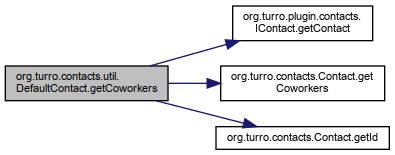
| String org.turro.contacts.util.DefaultContact.getDeepGrouping | ( | ) |
Implements org.turro.plugin.contacts.IContact.
Definition at line 149 of file DefaultContact.java.

| String org.turro.contacts.util.DefaultContact.getEmail | ( | ) |
Implements org.turro.plugin.contacts.IContact.
Definition at line 191 of file DefaultContact.java.
| String org.turro.contacts.util.DefaultContact.getFace | ( | ) |
Implements org.turro.plugin.contacts.IContact.
Definition at line 672 of file DefaultContact.java.

| Faces org.turro.contacts.util.DefaultContact.getFaces | ( | ) |
Implements org.turro.plugin.contacts.IContact.
Definition at line 679 of file DefaultContact.java.

| String org.turro.contacts.util.DefaultContact.getFormal | ( | ) |
Implements org.turro.plugin.contacts.IContact.
Definition at line 176 of file DefaultContact.java.

| String org.turro.contacts.util.DefaultContact.getFriendly | ( | ) |
Implements org.turro.plugin.contacts.IContact.
Definition at line 171 of file DefaultContact.java.

| String org.turro.contacts.util.DefaultContact.getFullName | ( | ) |
Implements org.turro.plugin.contacts.IContact.
Definition at line 181 of file DefaultContact.java.

| String org.turro.contacts.util.DefaultContact.getGlobalId | ( | ) |
Implements org.turro.plugin.contacts.IContact.
Definition at line 139 of file DefaultContact.java.

| String org.turro.contacts.util.DefaultContact.getGrouping | ( | ) |
Implements org.turro.plugin.contacts.IContact.
Definition at line 144 of file DefaultContact.java.

| List<IContact> org.turro.contacts.util.DefaultContact.getHHRR | ( | ) |
Implements org.turro.plugin.contacts.IContact.
Definition at line 618 of file DefaultContact.java.
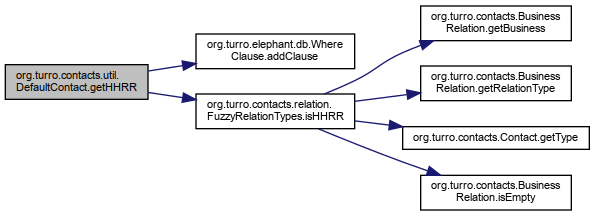
| String org.turro.contacts.util.DefaultContact.getId | ( | ) |
Implements org.turro.plugin.contacts.IContact.
Definition at line 134 of file DefaultContact.java.

| String org.turro.contacts.util.DefaultContact.getLangTranslator | ( | ) |
Implements org.turro.plugin.contacts.IContact.
Definition at line 770 of file DefaultContact.java.

| Locale org.turro.contacts.util.DefaultContact.getLocale | ( | ) |
Implements org.turro.plugin.contacts.IContact.
Definition at line 196 of file DefaultContact.java.

| IContact org.turro.contacts.util.DefaultContact.getLogged | ( | ) |
Implements org.turro.plugin.contacts.IContact.
Definition at line 787 of file DefaultContact.java.

| String org.turro.contacts.util.DefaultContact.getLogin | ( | ) |
Implements org.turro.plugin.contacts.IContact.
Definition at line 161 of file DefaultContact.java.

| String org.turro.contacts.util.DefaultContact.getName | ( | ) |
Implements org.turro.plugin.contacts.IContact.
Definition at line 166 of file DefaultContact.java.

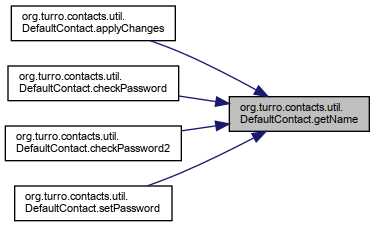
| Object org.turro.contacts.util.DefaultContact.getObject | ( | String | key | ) |
Implements org.turro.plugin.contacts.IContact.
Definition at line 416 of file DefaultContact.java.

| FlatPermissions org.turro.contacts.util.DefaultContact.getPermissions | ( | ) |
Implements org.turro.plugin.contacts.IContact.
Definition at line 461 of file DefaultContact.java.
| IProfile org.turro.contacts.util.DefaultContact.getProfile | ( | ) |
Implements org.turro.plugin.contacts.IContact.
Definition at line 684 of file DefaultContact.java.

| String org.turro.contacts.util.DefaultContact.getProperty | ( | String | key | ) |
| key | Attribute's key. |
Implements org.turro.elephant.security.IUser.
Definition at line 919 of file DefaultContact.java.
| List<IContact> org.turro.contacts.util.DefaultContact.getRelations | ( | ) |
Implements org.turro.plugin.contacts.IContact.
Definition at line 255 of file DefaultContact.java.

| List<IContact> org.turro.contacts.util.DefaultContact.getRelations | ( | String | id | ) |
Implements org.turro.plugin.contacts.IContact.
Definition at line 242 of file DefaultContact.java.


| IRelations org.turro.contacts.util.DefaultContact.getStaffRelations | ( | ) |
Implements org.turro.plugin.contacts.IContact.
Definition at line 236 of file DefaultContact.java.

| List<IContact> org.turro.contacts.util.DefaultContact.getStudents | ( | ) |
Implements org.turro.plugin.contacts.IContact.
Definition at line 631 of file DefaultContact.java.
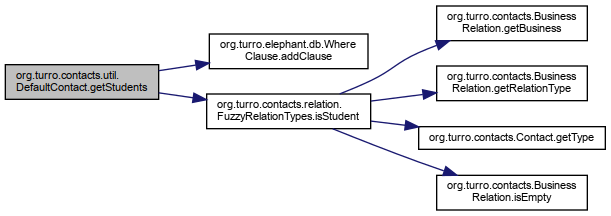
| List<String> org.turro.contacts.util.DefaultContact.getSyndications | ( | ) |
Implements org.turro.plugin.contacts.IContact.
Definition at line 448 of file DefaultContact.java.

| String org.turro.contacts.util.DefaultContact.getTradeName | ( | ) |
Implements org.turro.plugin.contacts.IContact.
Definition at line 186 of file DefaultContact.java.

| boolean org.turro.contacts.util.DefaultContact.hasAnyRoleKey | ( | String | role | ) |
Implements org.turro.elephant.security.IUser.
Definition at line 930 of file DefaultContact.java.
| int org.turro.contacts.util.DefaultContact.hashCode | ( | ) |
Definition at line 806 of file DefaultContact.java.
| boolean org.turro.contacts.util.DefaultContact.impersonate | ( | String | login | ) |
| login | User login. |
Implements org.turro.elephant.security.IUser.
Definition at line 883 of file DefaultContact.java.

| boolean org.turro.contacts.util.DefaultContact.impersonateByEmail | ( | String | ) |
Implements org.turro.elephant.security.IUser.
Definition at line 901 of file DefaultContact.java.
| boolean org.turro.contacts.util.DefaultContact.isActor | ( | Object | entity, |
| String | actor | ||
| ) |
| boolean org.turro.contacts.util.DefaultContact.isActor | ( | String | actor | ) |
| boolean org.turro.contacts.util.DefaultContact.isAdmin | ( | ) |
Implements org.turro.plugin.contacts.IContact.
Definition at line 689 of file DefaultContact.java.
| boolean org.turro.contacts.util.DefaultContact.isCenter | ( | ) |
Implements org.turro.plugin.contacts.IContact.
Definition at line 704 of file DefaultContact.java.

| boolean org.turro.contacts.util.DefaultContact.isCompany | ( | ) |
Implements org.turro.plugin.contacts.IContact.
Definition at line 699 of file DefaultContact.java.

| boolean org.turro.contacts.util.DefaultContact.isDeactivated | ( | ) |
Implements org.turro.plugin.contacts.IContact.
Definition at line 441 of file DefaultContact.java.

| boolean org.turro.contacts.util.DefaultContact.isHHRR | ( | ) |
Implements org.turro.plugin.contacts.IContact.
Definition at line 729 of file DefaultContact.java.

| boolean org.turro.contacts.util.DefaultContact.isHHRR | ( | IContact | business | ) |
Implements org.turro.plugin.contacts.IContact.
Definition at line 752 of file DefaultContact.java.

| boolean org.turro.contacts.util.DefaultContact.isInBusiness | ( | IContact | worker | ) |
Implements org.turro.plugin.contacts.IContact.
Definition at line 319 of file DefaultContact.java.
| boolean org.turro.contacts.util.DefaultContact.isInNetworking | ( | ) |
Implements org.turro.plugin.contacts.IContact.
Definition at line 758 of file DefaultContact.java.

| boolean org.turro.contacts.util.DefaultContact.isInPremiumNetworking | ( | ) |
Implements org.turro.plugin.contacts.IContact.
Definition at line 763 of file DefaultContact.java.

| boolean org.turro.contacts.util.DefaultContact.isInRole | ( | String | role | ) |
Usually this method should take this form:
if(user.isInRole("page:edit")) {
// edit page
}
| role | Role to check. |
Implements org.turro.elephant.security.IUser.
Definition at line 924 of file DefaultContact.java.
| boolean org.turro.contacts.util.DefaultContact.isInternal | ( | ) |
Implements org.turro.plugin.contacts.IContact.
Definition at line 709 of file DefaultContact.java.

| boolean org.turro.contacts.util.DefaultContact.isOutsider | ( | ) |
Implements org.turro.plugin.contacts.IContact.
Definition at line 792 of file DefaultContact.java.
| boolean org.turro.contacts.util.DefaultContact.isResponsible | ( | ) |
Implements org.turro.plugin.contacts.IContact.
Definition at line 724 of file DefaultContact.java.

| boolean org.turro.contacts.util.DefaultContact.isResponsible | ( | IContact | business | ) |
Implements org.turro.plugin.contacts.IContact.
Definition at line 746 of file DefaultContact.java.

| boolean org.turro.contacts.util.DefaultContact.isStudent | ( | ) |
Implements org.turro.plugin.contacts.IContact.
Definition at line 719 of file DefaultContact.java.

| boolean org.turro.contacts.util.DefaultContact.isStudent | ( | IContact | business | ) |
Implements org.turro.plugin.contacts.IContact.
Definition at line 740 of file DefaultContact.java.

| boolean org.turro.contacts.util.DefaultContact.isThisUser | ( | String | id | ) |
Implements org.turro.elephant.security.IUser.
Definition at line 914 of file DefaultContact.java.

| boolean org.turro.contacts.util.DefaultContact.isUser | ( | ) |
Implements org.turro.plugin.contacts.IContact.
Definition at line 694 of file DefaultContact.java.

| boolean org.turro.contacts.util.DefaultContact.isUserMenu | ( | ) |
Implements org.turro.plugin.contacts.IContact.
Definition at line 436 of file DefaultContact.java.

| boolean org.turro.contacts.util.DefaultContact.isValid | ( | ) |
Implements org.turro.plugin.contacts.IContact.
Definition at line 371 of file DefaultContact.java.

| boolean org.turro.contacts.util.DefaultContact.isWebapp | ( | ) |
Implements org.turro.plugin.contacts.IContact.
Definition at line 431 of file DefaultContact.java.

| boolean org.turro.contacts.util.DefaultContact.isWebUser | ( | ) |
Implements org.turro.plugin.contacts.IContact.
Definition at line 426 of file DefaultContact.java.

| boolean org.turro.contacts.util.DefaultContact.isWorker | ( | ) |
Implements org.turro.plugin.contacts.IContact.
Definition at line 714 of file DefaultContact.java.

| boolean org.turro.contacts.util.DefaultContact.isWorker | ( | IContact | business | ) |
Implements org.turro.plugin.contacts.IContact.
Definition at line 734 of file DefaultContact.java.

| IContact org.turro.contacts.util.DefaultContact.loadByEmail | ( | String | ) |
Implements org.turro.plugin.contacts.IContact.
Definition at line 509 of file DefaultContact.java.

| Object org.turro.contacts.util.DefaultContact.loadById | ( | String | id | ) |
Implements org.turro.plugin.contacts.IContact.
Definition at line 91 of file DefaultContact.java.

| Object org.turro.contacts.util.DefaultContact.loadByLogin | ( | String | login | ) |
Checks both, login and id, since login has been replaced in wiki generated files.
Implements org.turro.plugin.contacts.IContact.
Definition at line 103 of file DefaultContact.java.
| IContact org.turro.contacts.util.DefaultContact.loadByName | ( | String | name | ) |
Implements org.turro.plugin.contacts.IContact.
Definition at line 501 of file DefaultContact.java.

| List<IContact> org.turro.contacts.util.DefaultContact.loadByPartialName | ( | String | name | ) |
Implements org.turro.plugin.contacts.IContact.
Definition at line 484 of file DefaultContact.java.
| List<IContact> org.turro.contacts.util.DefaultContact.loadByPartialName | ( | String | name, |
| KeyValueMap | kvm | ||
| ) |
Implements org.turro.plugin.contacts.IContact.
Definition at line 489 of file DefaultContact.java.

| Object org.turro.contacts.util.DefaultContact.loadLogged | ( | Application | app | ) |
Implements org.turro.plugin.contacts.IContact.
Definition at line 111 of file DefaultContact.java.

| void org.turro.contacts.util.DefaultContact.reload | ( | ) |
Implements org.turro.elephant.security.IUser.
Definition at line 906 of file DefaultContact.java.
| void org.turro.contacts.util.DefaultContact.resetPermissions | ( | ) |
Implements org.turro.plugin.contacts.IContact.
Definition at line 469 of file DefaultContact.java.
| void org.turro.contacts.util.DefaultContact.setAttribute | ( | String | key, |
| Object | value | ||
| ) |
Implements org.turro.plugin.contacts.IContact.
Definition at line 527 of file DefaultContact.java.

| void org.turro.contacts.util.DefaultContact.setConnector | ( | String | id, |
| String | value | ||
| ) |
Implements org.turro.plugin.contacts.IContact.
Definition at line 324 of file DefaultContact.java.
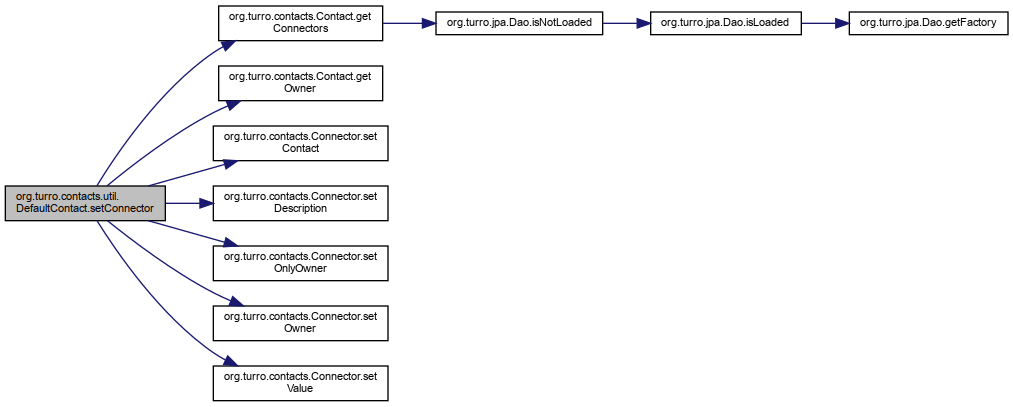
| void org.turro.contacts.util.DefaultContact.setContact | ( | Object | contact | ) |
Implements org.turro.plugin.contacts.IContact.
Definition at line 127 of file DefaultContact.java.
| void org.turro.contacts.util.DefaultContact.setName | ( | String | value | ) |
Implements org.turro.plugin.contacts.IContact.
Definition at line 343 of file DefaultContact.java.
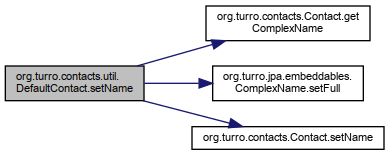
| void org.turro.contacts.util.DefaultContact.setObject | ( | String | key, |
| Serializable | value | ||
| ) |
Implements org.turro.plugin.contacts.IContact.
Definition at line 421 of file DefaultContact.java.

| void org.turro.contacts.util.DefaultContact.setPassword | ( | String | newValue, |
| String | repeatValue | ||
| ) |
Implements org.turro.plugin.contacts.IContact.
Definition at line 351 of file DefaultContact.java.

| void org.turro.contacts.util.DefaultContact.startContactFromValues | ( | KeyValueMap | values | ) |
| void org.turro.contacts.util.DefaultContact.syndicate | ( | String | syndicationName, |
| boolean | syndicate | ||
| ) |
Implements org.turro.plugin.contacts.IContact.
Definition at line 660 of file DefaultContact.java.

| boolean org.turro.contacts.util.DefaultContact.validate | ( | String | login, |
| String | password | ||
| ) |
| login | User login. |
| password | User password. |
Implements org.turro.elephant.security.IUser.
Definition at line 849 of file DefaultContact.java.

| boolean org.turro.contacts.util.DefaultContact.validate2 | ( | String | password2 | ) |
| password2 | User password2. |
Implements org.turro.elephant.security.IUser.
Definition at line 878 of file DefaultContact.java.
|
protected |
Definition at line 77 of file DefaultContact.java.
|
protected |
Definition at line 846 of file DefaultContact.java.